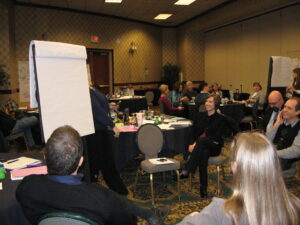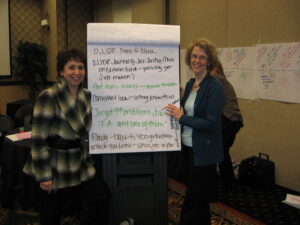 The National Council of Juvenile and Family Court Judges (NCJFCJ) was awarded the 2010 Juvenile Drug Court Training and Technical Assistance grant from the Office of Juvenile Justice Delinquency and Prevention this past October. NCJFCJ has been providing training and technical assistance to the juvenile drug court field since 1998 and this funding provides the opportunity to step back and look at the juvenile drug court field as a whole and determine how best to move the field forward. In order to begin envisioning the future of the field, NCJFCJ has formed a Project Advisory Committee (PAC) to serve as the driving force for training and curriculum development. Because, NCJFCJ’s vision for juvenile drug courts consists of a more holistic viewpoint, members from a wide array of systems were invited to participate in the meeting (i.e., researchers/evaluators, mental health, schools, substance abuse/use treatment, mentoring programs, screening/assessment, and juvenile justice).
The National Council of Juvenile and Family Court Judges (NCJFCJ) was awarded the 2010 Juvenile Drug Court Training and Technical Assistance grant from the Office of Juvenile Justice Delinquency and Prevention this past October. NCJFCJ has been providing training and technical assistance to the juvenile drug court field since 1998 and this funding provides the opportunity to step back and look at the juvenile drug court field as a whole and determine how best to move the field forward. In order to begin envisioning the future of the field, NCJFCJ has formed a Project Advisory Committee (PAC) to serve as the driving force for training and curriculum development. Because, NCJFCJ’s vision for juvenile drug courts consists of a more holistic viewpoint, members from a wide array of systems were invited to participate in the meeting (i.e., researchers/evaluators, mental health, schools, substance abuse/use treatment, mentoring programs, screening/assessment, and juvenile justice).
NCJFCJ convened the first PAC meeting February 24-25, 2011 in Reno, Nevada (NCJFCJ’s headquarters). The purpose of the PAC meeting was to visualize resources and policies needed for a juvenile drug court “in a perfect world,” identify the gaps between the perfect-world and our current one, and propose training and technical assistance focused solutions. Among the highlights of the meeting were a timeline that was constructed with not only the notable dates in juvenile drug court history, but also with milestones from the substance abuse treatment field, mental health field, and the education field. At the conclusion of the meeting the PAC identified people, publications, and programs that could serve as resources for NCJFCJ and discussed creative ways to market the available training and technical assistance.
 It was clear from the meeting that juvenile justice in general and juvenile drug courts will benefit greatly from current research on adolescent development, mental health and trauma, and substance abuse treatment. As this research continues, courts will have a greater understanding of the underlying reasons that youth use and abuse substances, while also having more tools to appropriately address this behavior. NCJFCJ is planning to create training and technical assistance tools for juvenile drug courts to incorporate research into their day-to-day practices.
It was clear from the meeting that juvenile justice in general and juvenile drug courts will benefit greatly from current research on adolescent development, mental health and trauma, and substance abuse treatment. As this research continues, courts will have a greater understanding of the underlying reasons that youth use and abuse substances, while also having more tools to appropriately address this behavior. NCJFCJ is planning to create training and technical assistance tools for juvenile drug courts to incorporate research into their day-to-day practices.
In addition, it is clear from the feedback NCJFCJ has received from the field via an online survey that training and technical assistance is very much needed. Many JDC’s are currently struggling with sustainability issues and resource development. These courts need information and technology transfer training on creating community partnerships and collaborative planning to continue operation. NCJFCJ has several resources that can be downloaded for free from www.ncjfcj.org that may help JDC’s that are dealing with these challenges; please look at Managing and Sustaining your Juvenile Drug Court and Ensuring Fidelity to the Juvenile Drug Courts Strategies in Practice—A Program Component Scale.
NCJFCJ has begun working with the Nation’s 476 juvenile drug courts to provide comprehensive training and technical assistance and will be conducting multiple webinars, subject-specific conference calls, and face-to-face trainings throughout the project period, which is scheduled to run through March, 2013.
